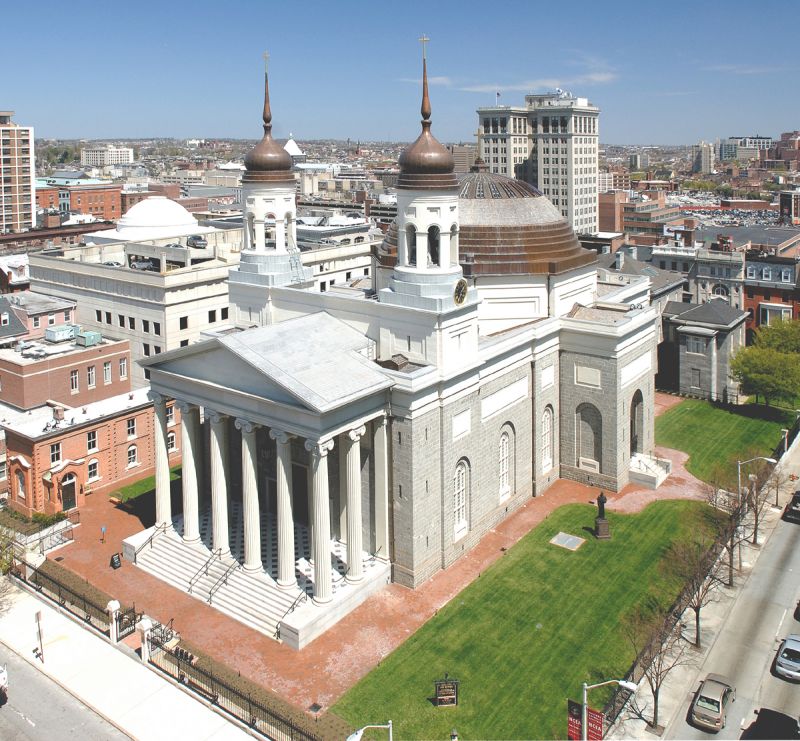
As a basilica in Baltimore celebrates its 200th anniversary this weekend, its rector says one celebration will stand above the rest – the beginning of perpetual Eucharistic adoration in the city.
“I think the focus has to be on the adoration,” Fr. James Boric, rector of the National Shrine of the Basilica of the Assumption of the Blessed Virgin Mary in Baltimore, told CNA on Friday.
“Everything else is an event,” he said of a year of planned bicentennial celebrations at the basilica that begin on Monday, adding that Eucharistic adoration “is what we all need. We need to be in front of our Lord.” Perpetual adoration at the basilica will begin on Monday, May 31.
While possessing a storied history, the basilica “needs to be a beacon of faith now,” he said. “What I like a lot is that we can use the historical significance of this great church to have an impact on souls now.”
Baltimore’s Basilica of the Assumption, once the cathedral of the first Catholic diocese established in the United States, will be celebrating its bicentennial this weekend.
It was dedicated on May 31, 1821, and will be hosting a Mass offered by Archbishop William Lori of Baltimore in celebration of its bicentennial at 2 p.m. on May 31, 2021, the feast of the Visitation. The Mass is open to the public, in accordance with city guidelines requiring masks and three feet of social distancing between households.
Monday’s Mass kicks off a year-long celebration of the basilica, which includes perpetual Eucharistic adoration. Archbishop Lori will bless the adoration chapel on Monday after Mass.
“The cathedral is really the mother church in the United States of America,” Archbishop Lori told CNA on Friday.
The basilica is the first Catholic cathedral and Marian national shrine in the United States, constructed from 1806-1821. Bishop John Carroll laid the cornerstone, and Benjamin Henry Latrobe, Thomas Jefferson’s architect of the U.S. Capitol building, oversaw the basilica’s design and architecture.
“It is meant to be a deeply Catholic structure, but also a structure that reflects the new republic in which fundamental freedoms were constitutionally guarantees, including and especially freedom of religion,” Lori said.
Fr. Boric sees adoration as central to the basilica’s mission – to be a living parish and not a historical “museum.”
“It’s the heart of the Church of America. So if the heart is strong, that has to have a good effect for the entire country,” he said. “I don’t think you could have stronger heart than by making Jesus available perpetually.”
And adoration should prompt parishioners to then practice charity on the streets of the city, he added.
“I like to say that we are a John 6 and a Matthew 25 parish – that our focus is on the Eucharist, and because our focus is on the Eucharist, it compels us to serve the poor,” he said.
Inner city Baltimore suffers from problems including homelessness and drug addiction, he said. The basilica is trying to form young parishioners “into very strong disciples of Christ,” he said, to adore Jesus and then to serve others. Seven missionaries at the parish are currently devoting a period of their lives to prayer and service, “to bring the love of Christ to the people who are the most forgotten.”
“These young people work with, know, and love the homeless,” Archbishop Lori said of the missionaries.
Other activities planned for the bicentennial year include a celebration on the basilica’s patronal feast day of the Assumption, on August 15. Cardinal Timothy Dolan of New York will deliver a lecture on the history of the church and the archdiocese on August 14; the next day, Bishop Robert Barron, auxiliary bishop of Los Angeles, will deliver the homily at a Mass celebrated by Archbishop Lori.
In November, the U.S. bishops will concelebrate Mass together at the basilica, as they normally do at their annual fall meetings in Baltimore. The basilica also plans to host Cardinal Robert Sarah, the former prefect of the Vatican’s Congregation for Divine Worship, in May 2022, Fr. Boric told CNA.
“Our world is just suffering so much from disunity,” Fr. Boric said. “This [bicentennial] is a reminder to us of the unity of Christ and of our faith.”
If you value the news and views Catholic World Report provides, please consider donating to support our efforts. Your contribution will help us continue to make CWR available to all readers worldwide for free, without a subscription. Thank you for your generosity!
Click here for more information on donating to CWR. Click here to sign up for our newsletter.




Leave a Reply